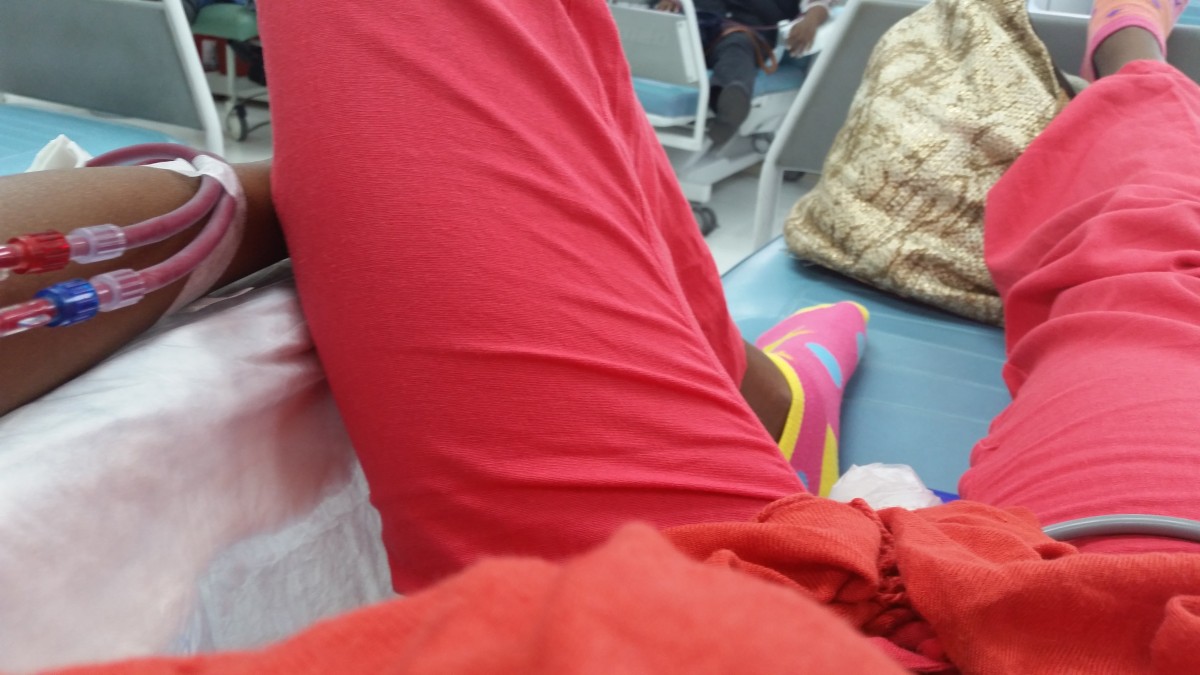If I could have ripped it out I would have, but the tube connecting me to the machine was also connected to my heart. The cramping pain was so intense I just wanted it to stop. I was new on the unit, but the other patients were familiar with the struggle. They watched me, no doubt, feeling sympathetic as I bawled out for help.
“Nurse, nurse. What’s happening? Please. Make it stop.”
They asked if I wanted to stop my treatment. The question confused me. I didn’t want to stop the treatment. I wanted to stop the pain. What would it mean if I couldn’t endure? Would I feel sick from my contaminated blood? But how could I survive the agony.
I deferred to a common technique used when I have menstrual cramps: take off all the constricting clothes. As I stripped off my skirt, which was pressing against my abdomen, a nurse rushed over, wondering what this mad woman was doing. I probably looked determined to get naked. I know I didn’t care about being exposed. I just needed to get rid of the pain. Plus, my body was in a mad cold sweat with the shivers. I couldn’t decide if I wanted to be exposed or covered by the blanket. The pores on my body were leaking sweat and yet there was a chill that consumed me.
And then the pressure moved through my bowels.
“I need to use the bathroom. Now.” There was no longer any debate.
The nurse disconnected the red line and the blue line from my catheter and screwed on the caps. She didn’t bother to clean the catheter or seal it with gauze like usual, because I couldn’t wait. She left the tubes hanging from my collarbone like two little bag tags.
I jumped out of bed tangled in my blanket. It was fortunate; otherwise I would have bared all of my (sexy) legs on the open unit. I quickly solved the nurse’s problem by flinging the pashmina shawl I always travelled with around my waste and scurried off to the bathroom.
As I sat on the toilet, dripping with sweat, keeled over and writhing from the cramps, I bawled to the nurse for something to elevate my legs. My position on the low toilet had kinked up my bowls and I needed whatever was inside of me to pass. The nurse brought a box to prop up my legs. It sunk a little under my weight, but it was better than nothing. She brought a rag to sop up my sweat. She stood over me, mopping my forehead, cramped inside the small bathroom with the door ajar, patiently waiting for something to soothe my pain.
I made my first friend on the dialysis unit that night. He gave my mother his number. Told her I had been feeling bad, but I would be okay, as the first treatments are sometimes difficult. She had been waiting for me in the waiting room outside; unaware of what was transpiring behind the treatment doors; unaware I was keeled over inside a bathroom, just beyond the wall adjoining the waiting room.
When I finally made it back inside the treatment room the nurse made me ginger tea; it soothed my body and my sensibilities. I looked like a train wreck, which was entirely appropriate, as I felt like someone who had just survived a train wreck. Whatever it was that happened to me that day, I prayed it would never happen again, even though it broke the ice with the other patients and garnered my first friend.
